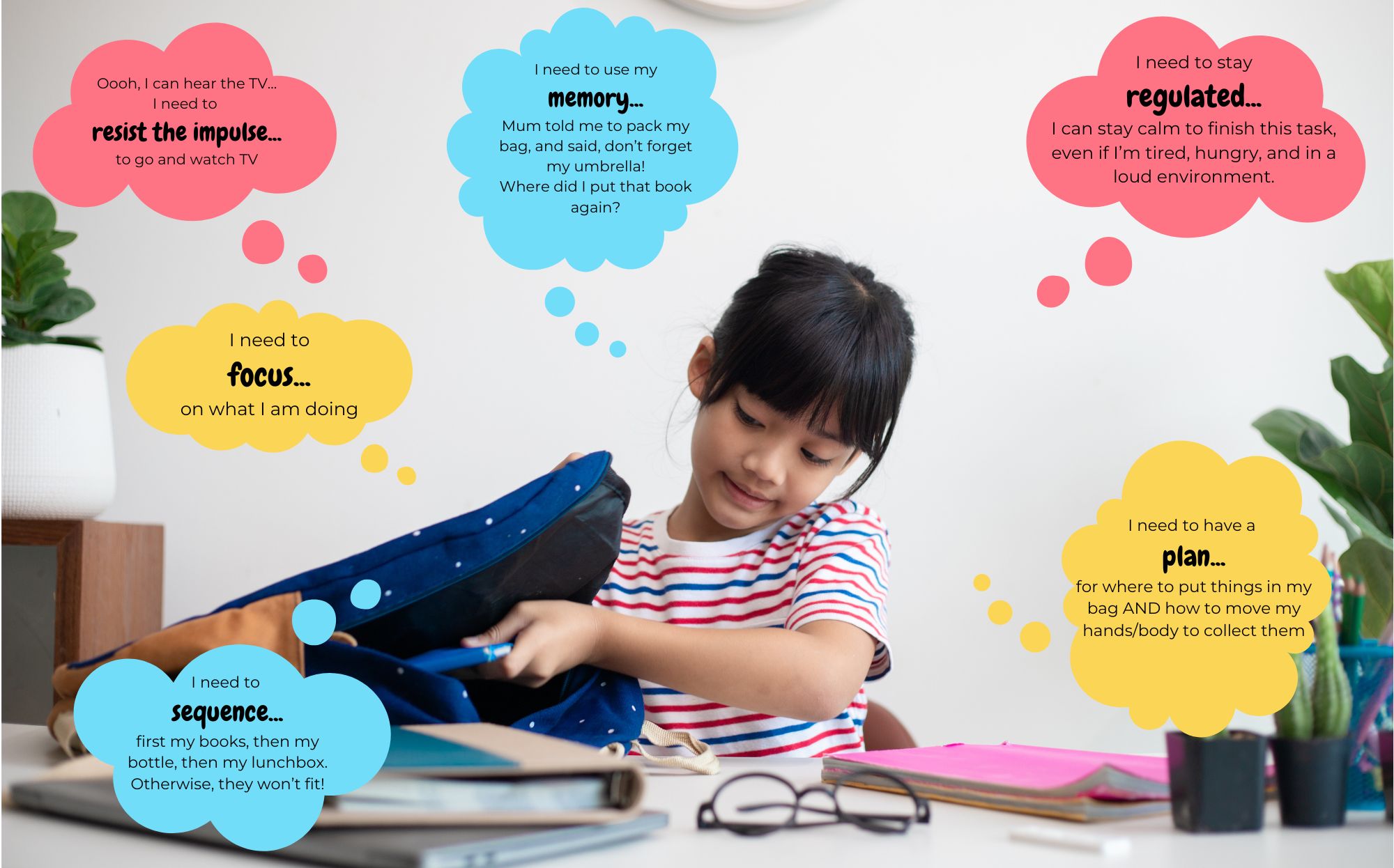Self-Organisation: What is it and why do we need it?

Self-organisation is our ability to independently manage ourselves so we can plan, monitor, and successfully complete a task. This involves knowing what’s required of the task, understanding how to do it, and when to complete it by.
Babies and toddlers rely on the trusted adults around them to help organise them. As they grow through preschool and primary school age, children learn to organise themselves by picking up skills by exploring through play, doing things together with their trusted adults, or by watching adults organise themselves.
Self-organisation is more complex than you might think!
Let’s go through an example of what is happening for our children when they need to organise themselves to complete one task, like packing their school bag:

Packing their bag is just one component in the whole routine of getting ready for school…
Children need to learn to self-organise in play, self-care, school tasks, chores, social interactions, and many more areas.
Imagine what else is happening in our children’s brains as they move through all the different tasks!
How do I know my child needs support with self-organisation?
Self-organisation typically develops across a spectrum of different skills, and can vary depending on the complexity of the task and home environment. You might see the following milestones:
By age 2
- Removes loose clothing (e.g., jacket, shirt), without assistance
- Puts on simple clothing independently
- Puts familiar objects away
By age 3
- Take off own shoes, sock, loose pants
- Washes and dries hands and face
- Gets drink of water unassisted
- Brushes teeth independently
- Independently eats entire meal with spoon
By age 4
- Completes simple errands
- Plays group or card games
- Dresses self completely (except shoelaces)
- Returns objects to their appropriate place
- Serves self at the table
By age 5
- Puts dirty dishes in the sink/dishwasher
- Selects clothing appropriate for temperature and occasion
- Makes own bed
- Independence in self care routines – toileting, brushing teeth, brushing hair
- Crosses street safely
By age 6
- Makes simple breakfast and lunch
- Sets and clears table without assistance
- Takes shower/bath independently
- Answers the phone, remembers a simple message, and delivers it to the correct person
For some children, they might need more support to learn all the different skills needed to organise themselves.
You might see:
- Forgetting the steps of the task
- Gets distracted easily
- Only remember the first or last step
- Have trouble ordering the steps in the right order
- Get frustrated or anxious before completing a task
How can Occupational Therapists help?
The above skills are collectively called our executive functions. They are a set of mental skills that children learn to develop through play and everyday experiences.
Executive functions… are like a sports coach. The coach leads the team or the collaborative play who seeks to accomplish his or her best, while bearing in mind a collective goal or function to advance in the game.
- Josman & Meyer, 2018
Occupational Therapists can help identify the barriers which affect a child’s ability to organise themselves and participate in their day to day activities. Through assessments and dynamic clinical observations, they might look at a your child’s:
- Participation and engagement in their daily tasks at home and school
- Sensory processing
- Play skills
- Executive functions
- Physical development
- Home/school environment
- Regulation
How can I support my child at home/school?
Here are some strategies you might be able to help your child with self-organisation:
- Write the steps down – do this with your child
- Develop a checklist – tick them off as you go or check after the task
- Stick to routines – practice, practice, practice
- Set reminders – visuals, phone alarms, Alexa, calendars
- Say your planning strategies aloud – your child can learn through you!
- Model the activity through pretend play
Sometimes it might not be clear whether your child needs support to develop their self-organisation skills. If you have any concerns about your child’s engagement or development, or if you would like more information about self-organisation, please feel free to contact our Client Care team via [email protected] or call us on (07) 3265 4495.

Written by Jaime Siu, Occupational Therapist
